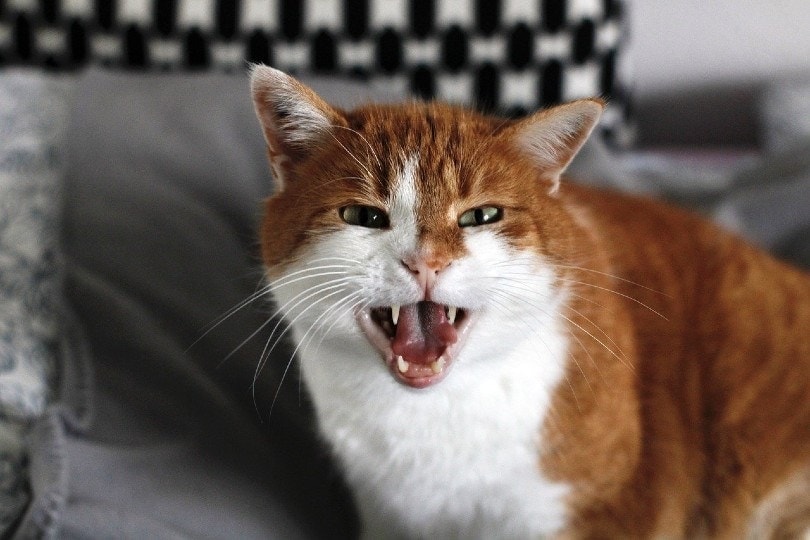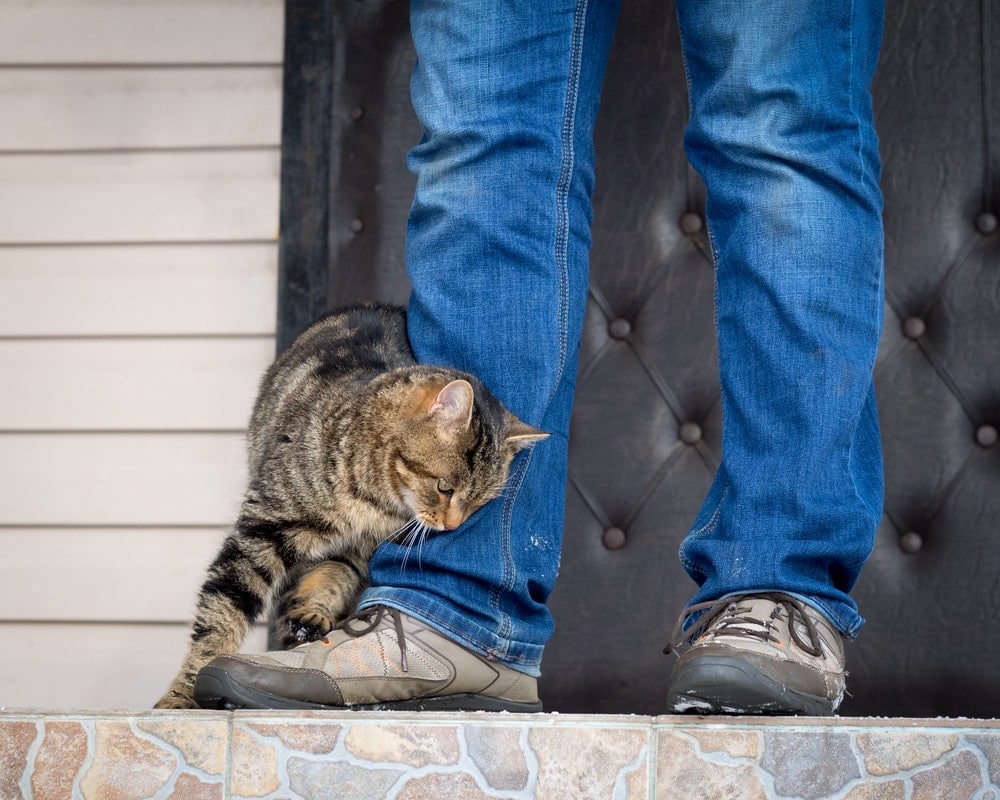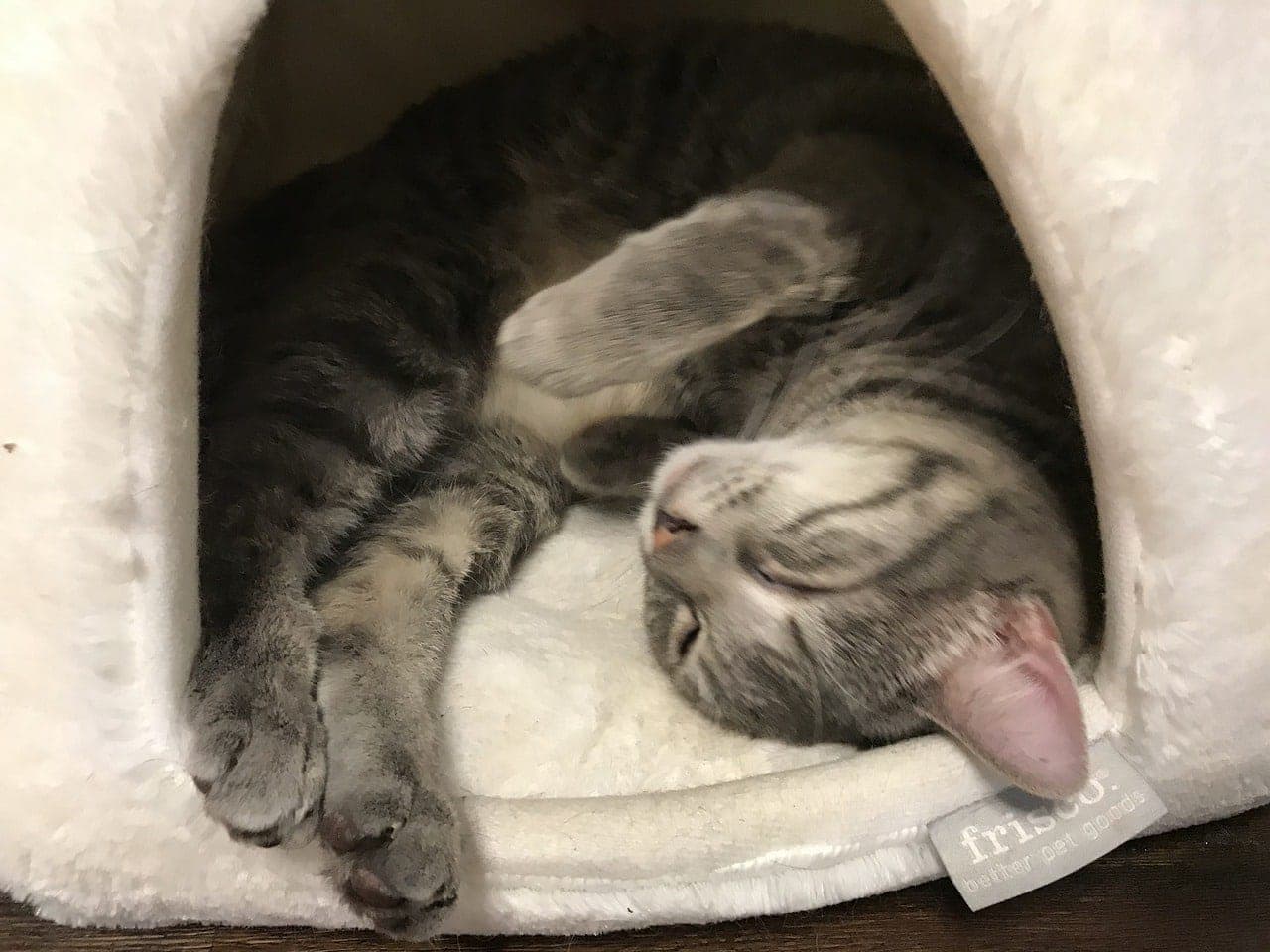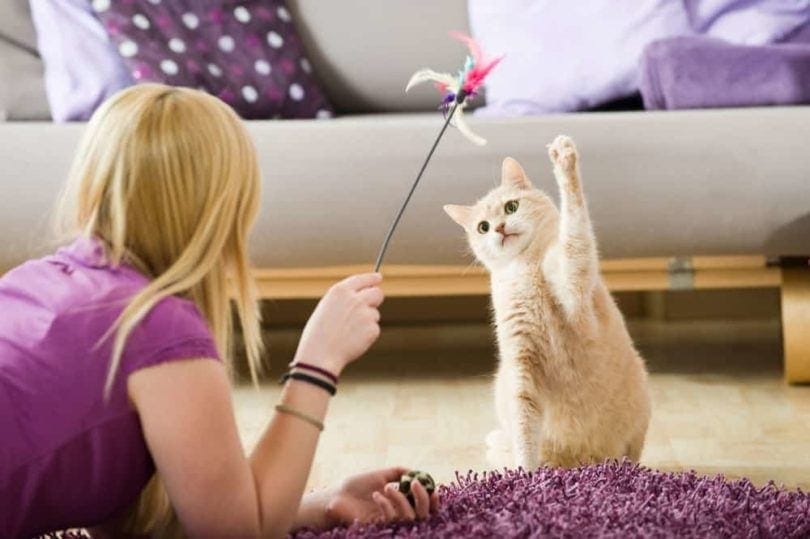Why Does My Cat Growl and Hiss at Strangers? Vet-Reviewed Facts

Updated on

It would be nice if our pets could just use their words and communicate with us verbally. But since that’s impossible, we have to do all we can to interpret what their meowing, trilling, growling, and hissing sounds mean.
You might be feeling concerned if your kitty has been displaying aggressive behaviors like growling and hissing at strangers. Cats are territorial and easily stressed, and any new person, animal, or object in their environment can upset the very delicate equilibrium they have.
Keep reading to learn why your cat is growling and hissing at strangers and what you can do to help prevent this behavior.
Domesticated cats experience very little variability in their environment. Their homes are predictable and safe places. Their daily routine is the same day in and day out, and they tend to like it that way. So, when a change happens in their environment, cats can feel disgruntled, frustrated, scared, and stressed.
Change in Routine
If you’re having a weekend visitor, particularly if there are more of them or there are young and loud kids, your cat’s sense of equilibrium is thrown off balance. This change in their daily routine can result in hissing or growling. Most cats will hide in this instance, but if they feel cornered and have nowhere safe and private to go, they may vocalize to express their anxiety.
Fear
Stranger-directed aggression is often born out of fear. They might be trying to protect their territory. Cats are innately territorial, so if they feel your guests are taking over their space, their growling and hissing might be their attempt at showing their fear and discomfort from their presence. They may feel that by acting big and scary, they’ll possess the power needed to scare your guests away.
Stress
Your cat might be feeling stressed and angry with the presence of a stranger in their territory. Both of these feelings can look and sound like growling and hissing. They may also be showing frustration if they can sense or see other cats or animals outside of the window but are not able to interact with them.
Warning
Sometimes cat’s growls act as a warning signal to other cats and animals that have entered their territory or confronted them. But cats can also growl and hiss if they are in pain or ill, so getting them checked by a vet is crucial in order to rule out underlying medical causes.
Luckily, many cats do not seem that fussed about visitors and strangers in their home and may either refuse to even acknowledge their presence, continue with their day-to-day routines, or in the case of especially curious and friendly cats, they may join the conversation and even ask for attention. Whichever they do, respect their character and allow them to choose how and if they want to interact with your friends.
However, let’s look at some tips to help calm the situation if your cat is not particularly keen on strangers in their home.

What Do My Cat’s Growls and Hisses Mean?
When a cat is growling or hissing, they’re trying to give you a warning sign that they’re miffed about something. You might also notice that their tail position is different, they’re baring their teeth, or that their fur is puffed out. All of these behavioral signals put together should clearly tell you that your cat is upset.
When their growling and hissing are accompanied by the above body language symbols, your cat is trying to tell you to back off. They’re trying to make themselves look scary so they’ll be intimidating and threatening in order to be left alone.
Not all growling and hissing is aggressive behavior, however. Your cats can become fearful and start to growl or hiss because of that fear, and this is often defensive behavior, with many cats running off and hiding. Rarely will they try to attack; usually only if they feel threatened or cornered.
What Can I Do if My Cat Is Hissing and Growling at My Guests?
There are several things you can try doing to help calm your cat if they’re stressed about strangers in their environment. But first, ensure your vet has ruled out any possible underlying or painful medical issues that may be the cause for this behavior.
Inform Your Guests
If your cat is growling and hissing at your guests, you need to tell them to back off. This is not the time for your guests to try and approach your cat to “win them over.” Your cat is not pleased with your guest’s presence in your home and the last thing they want is this stranger to stare at them and try to pet them.

Give Them an Escape Route
You should always have an escape route for your pet. Ensure they have a safe and private spot somewhere well out of the reach of the guests and without any noise or disturbance. Allow your cat to roam the home freely so they can choose where they want to be, when they need their privacy, or if they want to interact with you or your guests.
Enrich Their Space
If your cat is stressed or feeling frustrated, you can try enriching their environment with toys that stimulate them mentally and physically. Play with your cat as much as possible. This will provide them with an outlet and a distraction.
Reward Positive and Calm Behavior
As a cat owner, you should know that you can’t force a cat to do something they don’t want to do. The same rule applies to meeting strangers. You shouldn’t hold your kitty against their will and try to introduce them to people they’re uncomfortable around. This may lead to unnecessary stress or unwanted injuries.
If your cat is curious about new people, they will approach them when they’re ready. Reward them with treats and make it a positive and calming experience they will enjoy and remember. Keep the atmosphere relaxed and allow the cat to choose how much they want to interact with the new person.
Repeating the experience and always making it a positive one will show your cat that there is no reason to be scared and that good things, such as treats and toys, happen when visitors come over. Teaching them this from a young age will make it easier going forward and reduce their fear and anxiety from strangers.

Never Punish Your Cat
You should never punish your cat for growling or hissing. Instead, your goal should be to determine why they’re feeling fearful or frustrated and to try to make their environment more comfortable for them. Positive reinforcement is the only successful way to train cats.
Patience
Feline anxiety is as real of a condition as human anxiety. You need to remember that behavior modification will take time and that even slow progress is progress. Getting down to the root cause of the issue and addressing it is crucial, as is ruling out any painful conditions or illnesses during a veterinary examination. Let your kitty lead the way and be patient with them as they navigate sharing their home with a stranger.
Know that some cats just don’t do well with strangers and there may never come a time when they’re comfortable being petted or held by your guests, and that is fine. Respect your cat’s wishes on this matter.
Final Thoughts
Cats thrive on predictability and having a guest in your home will throw off that delicate balance that your cat needs to feel safe. That’s not to say that you’ll never be able to have strangers in your home because your cat feels uncomfortable around them. With some time, positive reinforcement, and patience, your cat may eventually come around to having new people in the house.
They should be rewarded for showing calm behavior during this time but should always have a safe way out and their own private space if they choose not to interact. Some cats, though, will only have eyes for their family members and you might just need to come to terms with the fact that your kitty will go into hiding any time you have guests over.
Make sure they have a quiet spot with a cozy bed and plenty of food and toys where they cannot be disturbed.
Featured Image Credit: yvonneschmu, Pixabay












